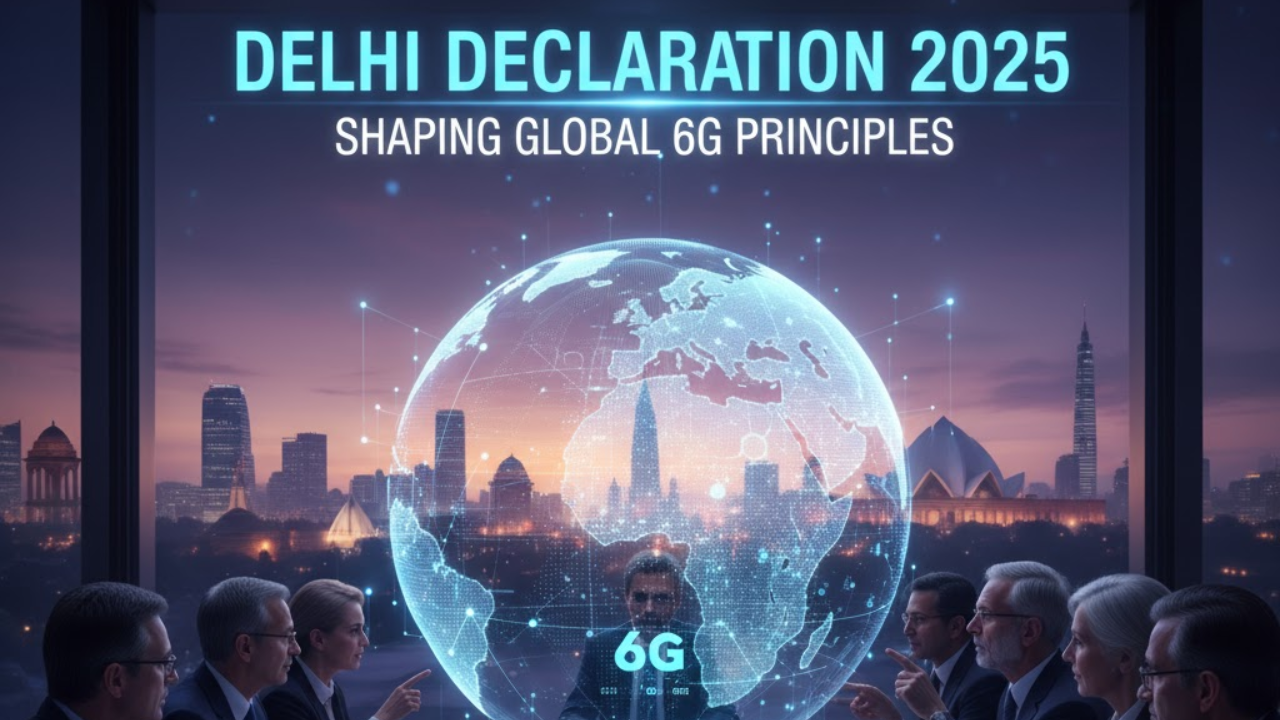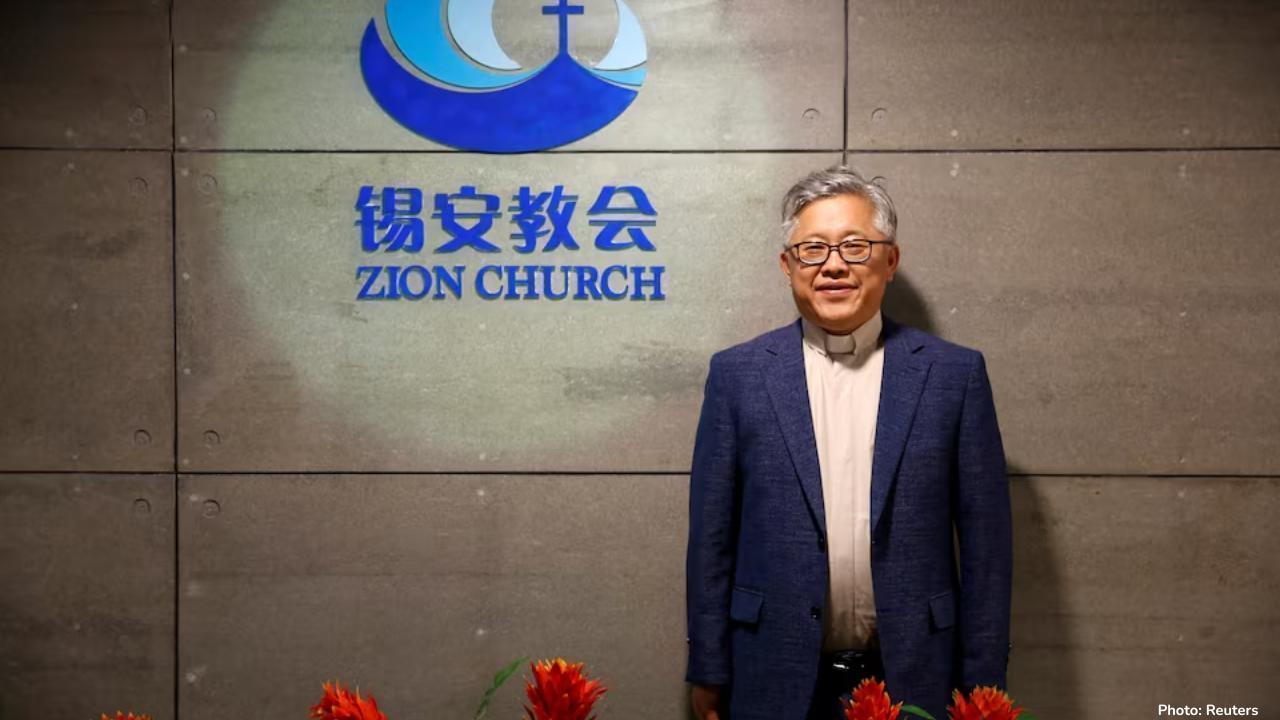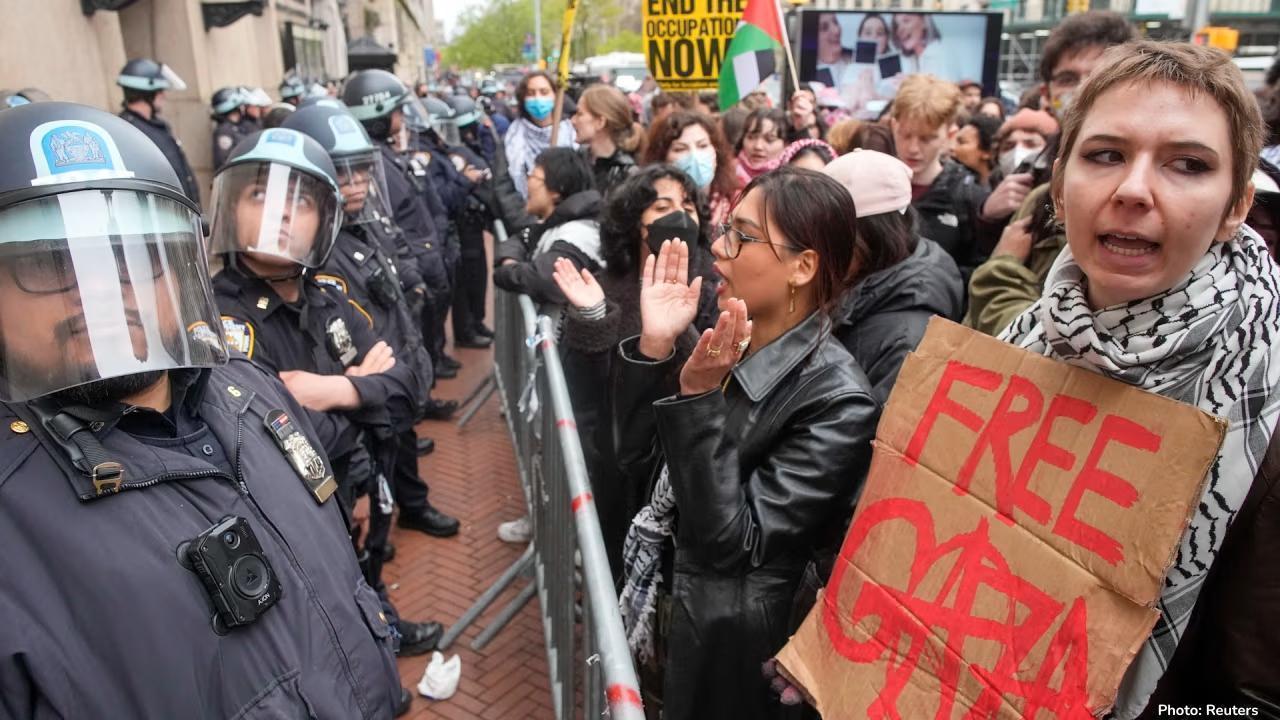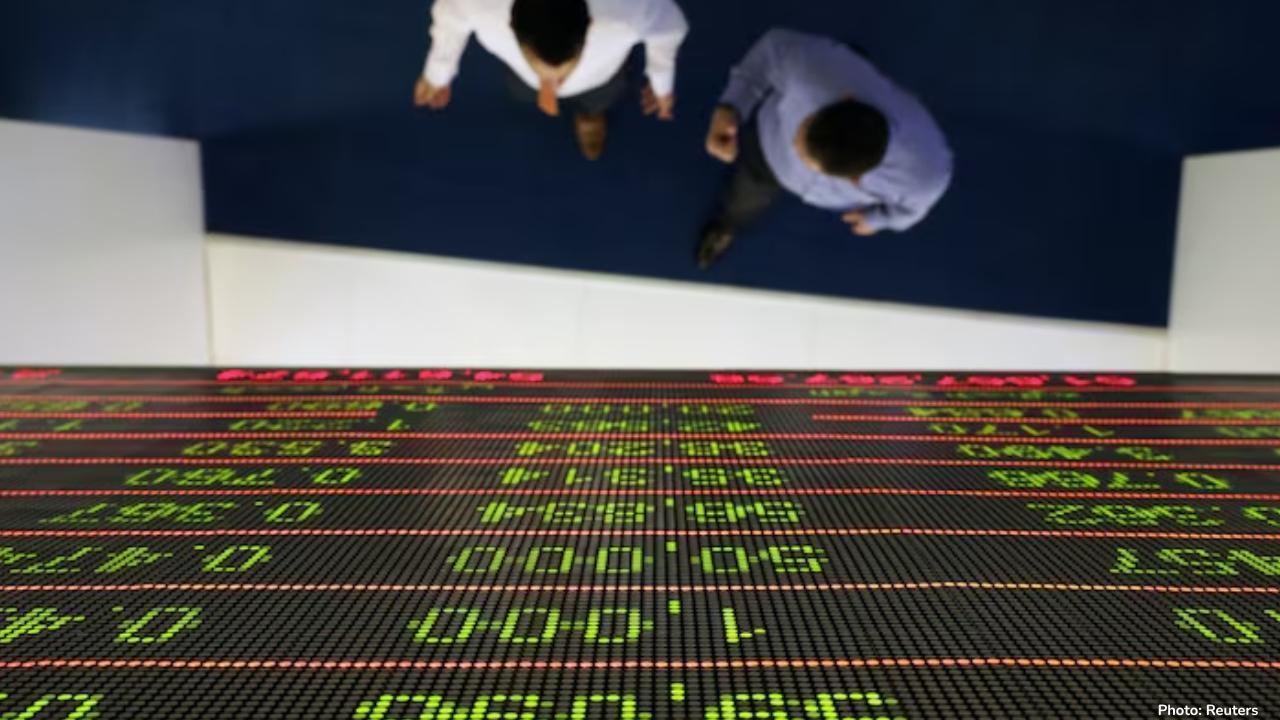
Post by : Naveen Mittal
In a landmark step toward shaping the future of global connectivity, India’s Bharat 6G Alliance (B6GA) and nine international organizations signed the “Delhi Declaration” during the India Mobile Congress (IMC) 2025 in New Delhi.
The declaration represents a collective commitment to developing 6G technology based on core principles of security, inclusivity, resilience, and sustainability.
It marks the first time multiple international partners have formally agreed to a unified vision for 6G, positioning India as a major player in the next phase of digital transformation.
The Delhi Declaration underscores that the race toward 6G is not just about speed and spectrum—it’s about responsible innovation that benefits humanity as a whole.
India’s rapid rollout of 5G networks in 2023–2024 laid the foundation for a new era of digital infrastructure. But as data demand, AI-driven systems, and connected devices multiply, the need for faster, smarter, and more secure connectivity becomes critical.
The world is now preparing for 6G, expected to debut commercially by 2030, delivering speeds up to 100 times faster than 5G and enabling technologies like holographic communication, digital twins, and the tactile internet.
Amid this transformation, India—through the Bharat 6G Alliance—has positioned itself as a key architect of global 6G policy and technology frameworks. The Delhi Declaration formalizes India’s leadership role in steering the evolution of 6G as a human-centric and sustainable technology revolution.
The Bharat 6G Alliance (B6GA) was established by the Indian government in 2023 as a collaborative platform bringing together stakeholders from government, academia, industry, and research institutions to shape India’s 6G ecosystem.
Its primary goals include:
Defining India’s 6G vision and roadmap.
Coordinating research between public and private sectors.
Promoting global standardization and interoperability.
Supporting indigenous technology development.
Ensuring ethical and inclusive growth in telecom innovation.
With the Delhi Declaration, B6GA now extends its influence beyond national borders, signaling India’s intent to co-lead the international dialogue on 6G ethics, security, and innovation.
The Delhi Declaration emphasizes that 6G must be built on trust, inclusion, sustainability, and innovation. It identifies guiding principles that all signatory nations and organizations have agreed to uphold during the global development and deployment of 6G networks.
6G systems must prioritize end-to-end cybersecurity, ensuring resilience against cyberattacks, espionage, and data manipulation. With AI deeply integrated into network management, security and transparency are non-negotiable.
One of the declaration’s strongest points is inclusivity—ensuring that 6G technology serves everyone, not just advanced economies. The focus is on bridging the digital divide and empowering developing regions through affordable connectivity.
6G must advance environmental goals by reducing energy consumption, minimizing e-waste, and promoting eco-friendly materials in device manufacturing and infrastructure deployment.
To avoid technological fragmentation, the declaration supports open, transparent standards that allow interoperability across borders and vendors.
As 6G integrates AI and machine learning at every layer—from network optimization to service delivery—the declaration calls for ethical frameworks to govern AI decisions, ensuring accountability and fairness.
Signatories agreed to establish joint research programs, testbeds, and innovation labs to accelerate experimentation in 6G architecture, spectrum utilization, and quantum communication.
Nine global organizations joined hands with the Bharat 6G Alliance in signing the declaration, including entities representing the United States, European Union, Japan, South Korea, Finland, and Singapore, along with international industry associations.
This cooperation signals a new era of multilateralism in telecom governance, where technological standards are not dictated by a single country but co-created through shared responsibility.
It also marks a strategic counterbalance to fragmented regional approaches, ensuring that 6G evolves as a globally harmonized ecosystem rather than isolated technological silos.
The Delhi Declaration goes beyond technical collaboration—it establishes normative principles for the 6G era.
By emphasizing transparency, open standards, and cross-border collaboration, the declaration redefines digital sovereignty—encouraging cooperation without compromising national interests.
It shifts focus from pure performance metrics (speed, latency) to human outcomes such as accessibility, empowerment, and sustainability.
With telecom infrastructure contributing significantly to global energy use, the declaration aligns 6G development with the United Nations Sustainable Development Goals (SDGs), promoting green infrastructure.
India’s leadership role ensures that 6G development remains inclusive and multi-polar, countering the dominance of a few technological powers.
By aligning diverse research frameworks, the declaration ensures efficient sharing of knowledge, patents, and testing environments—accelerating innovation while avoiding duplication.
6G is expected to deliver speeds of up to 1 Tbps, with latency as low as 1 microsecond, but the real revolution lies in its integration of intelligence, sensing, and sustainability.
AI-Native Networks: Networks that learn, self-optimize, and self-heal in real time.
Holographic and Immersive Communication: True 3D telepresence enabling lifelike remote collaboration.
Tactile Internet: Real-time haptic feedback for remote surgery, robotics, and industrial automation.
Digital Twins: Virtual replicas of physical systems, enabling predictive analysis and smart manufacturing.
Quantum-Safe Encryption: Enhanced security protocols resistant to quantum computing attacks.
Terahertz Spectrum Usage: New frequency bands enabling ultra-high-speed data transfer.
These innovations will transform industry, education, healthcare, and governance, driving global digital transformation in ways that transcend the 5G era.
India’s leadership in crafting the Delhi Declaration represents a paradigm shift in global telecom influence.
Historically, India’s role in telecom standards was limited to adoption; now, it’s actively shaping global norms and technologies.
National 6G Mission: Launched in 2023 to drive indigenous R&D and accelerate trials.
Bharat 6G Alliance Formation: A multi-stakeholder approach combining academia, industry, and government.
Rural Connectivity Focus: Commitment to making 6G accessible to rural and underserved populations.
AI and Quantum Research: Collaboration with leading research institutions for secure, intelligent network architecture.
India’s model—balancing innovation with ethics and inclusion—is now emerging as a template for global 6G governance.
The declaration’s focus on sustainability is a critical differentiator from previous telecom generations.
6G systems will employ AI-driven optimization to minimize power consumption in base stations and networks, achieving near-zero idle energy use.
The shift toward biodegradable materials in devices and antennas will reduce the environmental footprint of mass deployments.
Old network hardware will be refurbished and repurposed, supporting a circular telecom economy.
The declaration encourages renewable energy usage—solar-powered towers, AI-controlled cooling systems, and energy-efficient data centers—to make 6G carbon-neutral by design.
This aligns with India’s national commitment to net-zero carbon emissions by 2070, ensuring the telecom sector contributes to global climate goals.
The Bharat 6G Alliance serves as a bridge between government, academia, and industry. The Delhi Declaration expands this collaboration to international partners, fostering an ecosystem of open innovation.
Key collaborators are expected to include:
Telecom operators and infrastructure firms.
Global tech giants investing in AI and cloud computing.
Academic and research institutions conducting 6G trials.
Hardware manufacturers exploring terahertz and quantum components.
Such alliances will accelerate standards development, interoperability testing, and real-world experimentation across nations.
Despite the optimism, implementing the Delhi Declaration’s goals will not be without challenges.
6G networks require breakthroughs in physics, hardware miniaturization, and computing efficiency. Achieving these will need massive investment and collaboration.
The integration of AI and distributed systems introduces new vulnerabilities. Ensuring end-to-end encryption and quantum-safe protection is essential.
Diverse policy frameworks and data regulations across countries can slow global harmonization of standards.
Ensuring affordability in emerging markets remains a challenge, especially given the high cost of infrastructure.
With autonomous network management, maintaining transparency and accountability in AI-driven decisions becomes critical.
Nevertheless, the Delhi Declaration lays the groundwork for collaborative problem-solving, encouraging joint R&D and policy synchronization.
The Delhi Declaration outlines a forward-looking roadmap for collaborative 6G innovation:
2025–2027:
Joint testbeds and prototype trials.
Global research summits under B6GA coordination.
Establishment of ethical AI and data governance frameworks.
2028–2030:
Commercial pilot deployments in India and partner countries.
Refinement of green infrastructure and sustainable networks.
Launch of India-led 6G technology exports and services.
By 2030, the first generation of 6G-enabled smart cities, industries, and autonomous networks may be operational — built upon the principles first codified in the Delhi Declaration.
The signing of the declaration drew widespread international praise:
Telecom policymakers lauded India’s diplomatic leadership in uniting nations around common 6G goals.
Industry leaders highlighted its pragmatic balance between innovation and regulation.
Academia emphasized its value in standardizing ethical AI in future networks.
The declaration has effectively positioned India as a norm-setter in digital policy, not just a participant.
The development of 6G infrastructure and applications could add trillions of dollars to the global economy over the next decade.
For India alone, the 6G ecosystem is expected to:
Generate millions of high-skilled jobs in telecom, AI, and manufacturing.
Boost GDP growth through digital exports.
Strengthen the Make in India initiative for telecom equipment and components.
Enhance connectivity in rural and industrial regions.
As 6G becomes central to global trade, logistics, and innovation, India’s proactive involvement ensures it captures a significant share of the digital economy.
The Delhi Declaration 2025 unites India and nine international partners in a shared 6G vision.
The declaration promotes secure, inclusive, resilient, and sustainable technology development.
It cements India’s leadership in global 6G policy and innovation.
The focus extends beyond speed to human-centric, AI-driven connectivity.
Sustainable and ethical principles are central to its framework, aligning with global environmental and social goals.
This article is for informational purposes only. The details are based on current reports and statements from the India Mobile Congress 2025 and Bharat 6G Alliance announcements. Actual implementation and international partnerships may evolve as formal agreements are finalized.
6g technology, delhi declaration, bharat 6g alliance, india mobile congress, global 6g collaboration, sustainable connectivity, digital inclusion, secure networks, future telecom










Trump's Trade War Escalates, Disrupting IMF and World Bank Talks
President Trump's renewed trade war with China, including 100% tariffs and export controls, overshad

China Detains Dozens of Underground Church Pastors in Crackdown
China detains dozens of pastors from Zion Church, one of the largest underground Christian churches,

Gold & Silver Hit Record Highs Amid US-China Trade Tensions
Gold and silver prices reached all-time highs on October 13, 2025, driven by escalating US-China tra

Indian Police Investigate Cough Syrup Maker After Child Deaths
Indian authorities raid Sresan Pharma's facilities over toxic cough syrup linked to 19 child deaths;

18 Swiss Police Hurt in Pro-Palestine Protest in Bern
18 Swiss police officers were injured during an unauthorized pro-Palestine protest in Bern, leading

Egypt to Host Global Summit in Sharm el-Sheikh on Gaza War
Egypt will convene over 20 world leaders in Sharm el-Sheikh with Trump to finalize the Gaza war agre